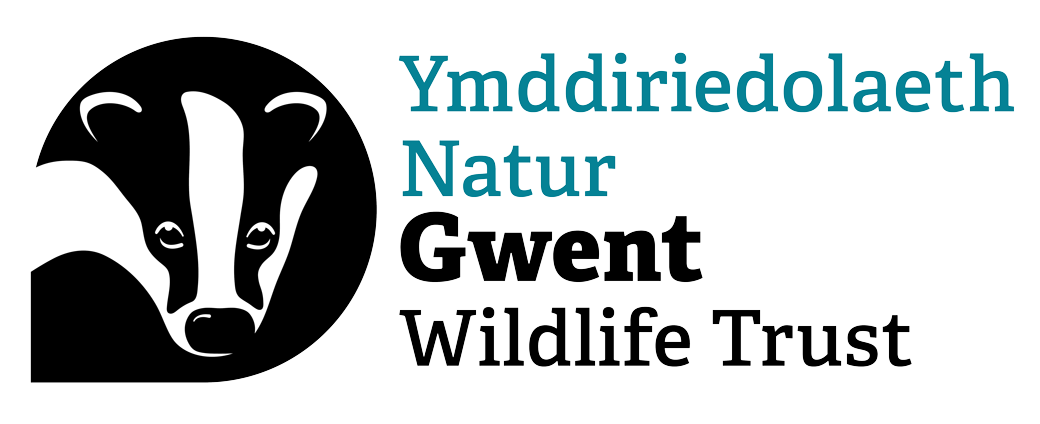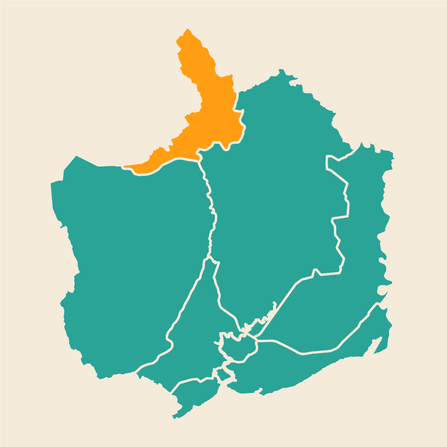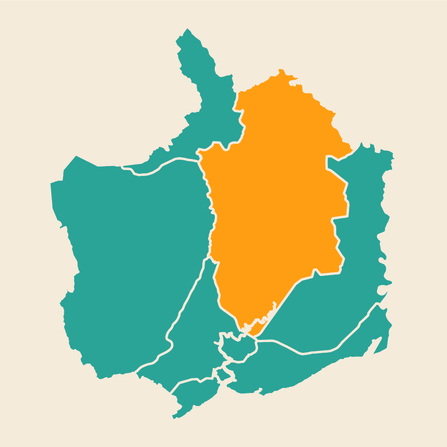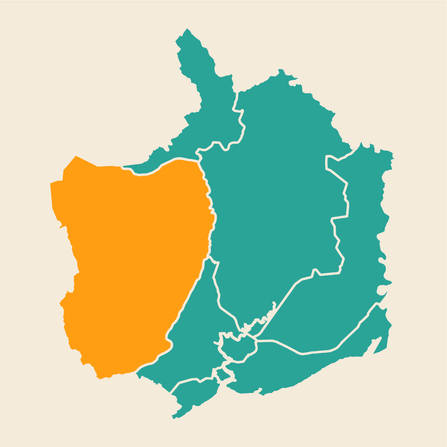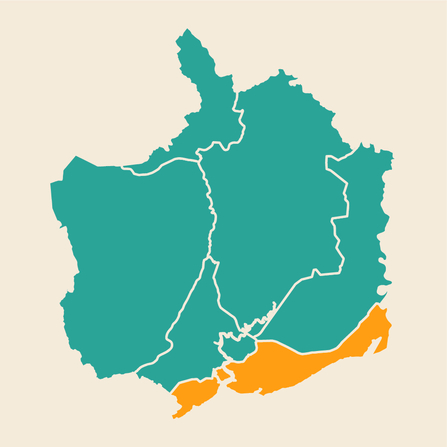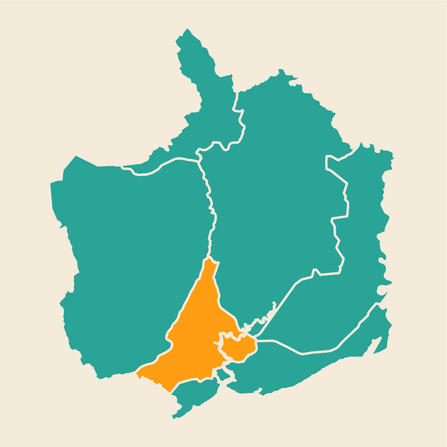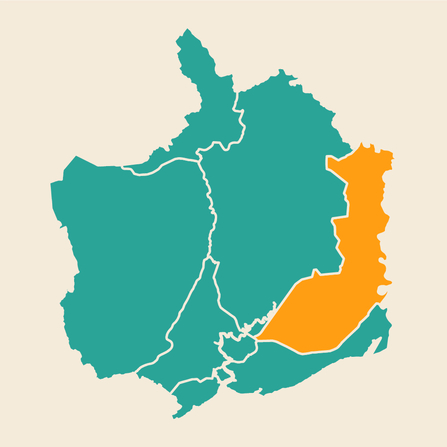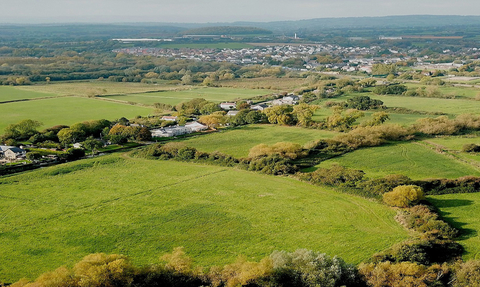
R Waller
South East Wales Landscape Profiles
Introduction to Landscape Profiles
In April 2019, partners and stakeholders working on well-being and natural resource management in South East Wales convened to form a set of Landscape Panels. These groups took a landscape approach to create a series of Landscape Profiles as part of the South East Area Statement co-production. Each Landscape Panel used the best available local and national evidence at that time to define their landscape character and significance. They also considered the drivers impacting ecosystems and the sustainable management of natural resources, as well as where we need to build resilience and why.
The Landscape Profiles were used as the evidence base for the next phase of development of the South East Area Statement, when stakeholders came together and identified specific actions for delivery under four strategic themes: Climate Ready Gwent, Linking Our Landscapes, Healthy Active Connected and Ways of Working. The last of these is the strategic theme that underpins the others, focusing on embedding meaningful collaboration and integration which lies at the heart of the landscape profile approach.
It is acknowledged that the landscape approach and the profiles co-produced at the time were not perfect. However, the process yielded a great deal of valuable experience which will be used to inform and enhance the next and future iterations of the South East Area Statement. The first landscape profiles provide a baseline that can now be built upon and improved collaboratively together.
Preface to Landscape Profiles
South East Wales Area Statement
The Environment (Wales) Act 2016 helps us to meet the challenge of ensuring that our natural resources are sustainably maintained, used and enhanced in a way which meets the needs of current and future generations.
Central to the Act is the need to adopt a new, more integrated approach to managing our natural resources to achieve long-term sustainability. The Act provides an iterative framework that ensures that managing our natural resources sustainably will be a core consideration in decision-making.
The Act has been designed so that the statutory National Natural Resources Policy has a positive impact at the most appropriate geographical scale. That’s why it requires Natural Resources Wales (NRW) to prepare, publish and review Area Statements. Each area of Wales must be included within at least one Area Statement (there are 7 in total for more information on other Area Statements see the NRW website).
Area Statements consider the evidence from the State of Natural Resources Report and identify the priorities, risks and opportunities for the sustainable management of natural resources (SMNR) at the local level.
Collaborating with key strategic partners
Area statements provide a local evidence base which can contribute to future publications of the State of Natural Resources Report. Area statements must be considered in local well-being assessments. Local planning authorities must have regard to Area Statements when preparing their Local Development Plan (LDP) and National Park Authorities must have regard to them when preparing or reviewing their management plans for National Parks. Area Statements will be the main tool through which future funding is allocated for environment-based projects and will also potentially drive post-Brexit land management payments. They will also drive NRW corporate business planning.
Although Natural Resources Wales is responsible for producing Area Statements, producing and implementing them is a collaborative process. Integration of evidence and understanding from other public bodies into the Area Statement will ensure shared priorities. In applying the principles of sustainable management of natural resources, Natural Resources Wales must also use collaborative approaches to develop Area Statements.
This approach improves decision making and reduces duplication through collaborative working between Natural Resources Wales and other public bodies.
It is therefore important that we work closely with our strategic partners in producing the South East Area Statement, and integrate collaborative opportunities to deliver wellbeing benefits in a way which helps shape strategic partnership working at the regional scale.
Integration
In Gwent, we designed our Area Statement in a way which best reflects our strategic partnership objectives. In doing so we developed, at an early stage, some emerging themes[1]; these themes largely reflect the regional priorities which have come out of the wellbeing planning process in Gwent.
The following paragraph identifies the vision of each of the emerging themes:
Linking our Landscapes: Identifying local opportunities for our protected sites, natural and built environments to contribute towards the resilience of wider priority habitat networks in the region. These opportunities for improving ecosystem resilience should support ecological connectivity between sites, across boundaries and at a landscape scale.
Climate Ready Gwent: Identifying landscape and regional scale opportunities and collective interventions for climate adaptation and mitigation.
Healthy, Active, Connected: Working with the primary and social care system to develop and deliver services and interventions that are focussed on using the natural environment.
Ways of working: Identifying the benefits of strategic regional collaboration. Identifying what we need to do once, well, at this regional scale to maximise local delivery.
Landscape Profiles: A mechanism for participation, cooperation and collaboration on the theme of ecosystem resilience
In April 2019, partners working on wellbeing and natural resources management in South East Wales convened to form a set of Landscape Panels. Landscape Panels were convened to co-create a series of landscape profiles, developed over a five-month period to August 2019. Each panel was required to collaborate to produce a common evidence base, which combines national and local evidence on the health of our ecosystems, to help identify where we need to improve the health of our natural assets and why.
Landscape Profiles are a mechanism to ensure that national evidence and grassroots technical knowledge together inform our understanding of ecosystem resilience in South East. They are also a mechanism to influence policy and inform place-based planning and delivery through the Area Statement. It is our ambition that landscape profiles will be fully integrated into how we work across South East Wales in the future.
Learning
Each Landscape Panel, whilst given a consistent set of questions to answer, were encouraged to reach a consensus around opportunities and develop a place-based approach in order to maximise the value of key strategic landscape scale partnerships across the region. As a result, each profile is quite different. The challenge of working in this way for NRW and its key stakeholders is not to be underestimated. This method of doing differently has highlighted gaps in our collective understanding of ecosystem resilience. It has also highlighted how and where we might need to create common methodologies across the region to better understand the root cause of issues and threats to the resilience of our most treasured of habitats. The approach has also tested our commitment and ability to collaborate in a meaningful way with our key stakeholders, whilst all partners recognise the benefits of the approach, all panel members have struggled to commit a great deal of resource to their creation whilst also delivering an already full schedule of work in line with existing (often statutory) commitments.
As such Landscape Profiles should be considered as working documents which will act as a mechanism for stakeholder participation and collaboration. We recognise they are not perfect and do not represent a final iteration of our collective knowledge. By sharing the outputs, we are hoping to build up from this first attempt towards a more coherent blueprint for landscape-scale partnership working in the future.
Next steps
The first Area Statements needed to be delivered by March 2020. The next phase of Area Statement development was to draw together the strands of evidence which had developed over the first 12 months of partnership working (including landscape profiles), to identify the actions that NRW and others can take to deliver the sustainable management of natural resources across the region.
We have done this through our existing partnership mechanisms within the Public Sector Body (PSB) sphere and beyond, calling upon technical experts and officers across all our organisations to support the identification of strategic interventions and activity which will add value to local delivery on the ground. In doing so, it is was aim to produce a steer for regional collaboration and integration which adds value to local partnership priorities.
What does this mean for you and your organisations?
We will be continuing to work closely with our key strategic partners to ensure that Area Statements become the aid to collaborative working that they need to be. The aim is to reflect on all evidence produced to date under each of the themes, so that we can:
- Build a consensus around how and where to maximise the services which our natural areas provide to the citizens of Gwent.
- Identify frameworks, methodologies and tools which can be used across the region to maximise the health of our natural areas and the benefits they provide.
- Use our best available combined evidence and technical expertise to identify spatial and landscape-scale opportunities for the delivery of SMNR.
- Develop an integrated State of Nature Report for Gwent and Nature Recovery Action Plan which addresses the root cause of threats to our ecosystems and addresses them at the appropriate scale.
- Identify regional pathways or strategic opportunities which will add value to local wellbeing delivery and improve the health of our natural areas.
[1] Emerging themes informed by SoNaRR 2016 ; Vital Nature; National Natural Resources Policy; Monmouthshire Wellbeing Plan; Torfaen Wellbeing plan; Newport Wellbeing Plan; Caerphilly Wellbeing Plan; Blaenau Gwent local wellbeing plan; Director of Public Health Annual Report 2018: A Healthier Future for Gwent; Gwent Futures Scenario Report; Brown, Netherwood, Thomas (2017) Gwent Well-Being Objectives Overview - Final Report.
